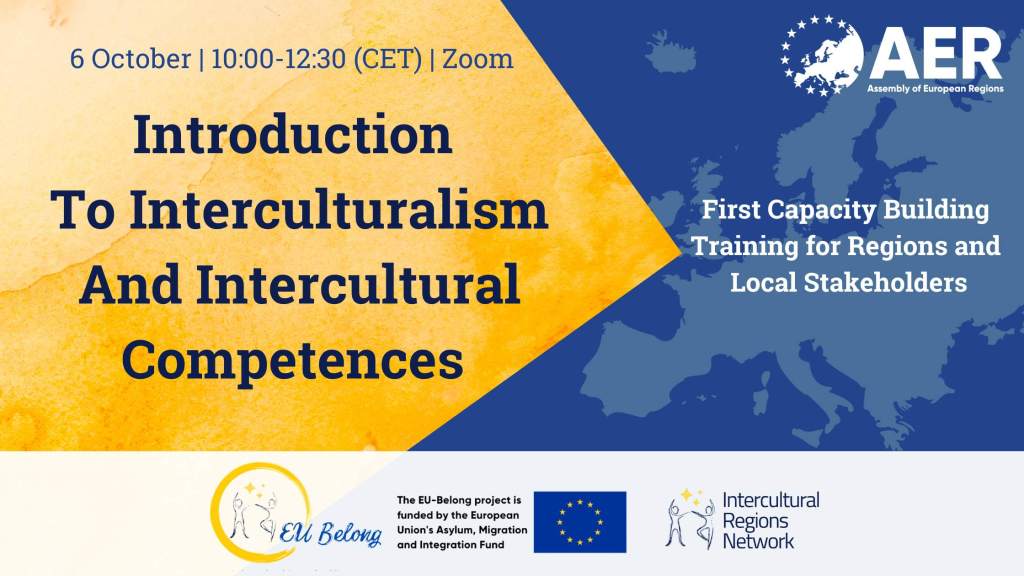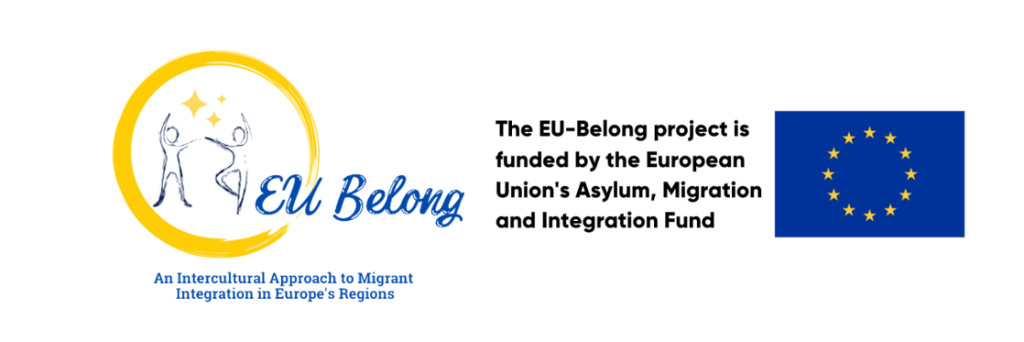We are a network
Multiple times per year, AER brings together regions, so that they may stand stronger together, and grow in a space of best practice exchange.

- This event has passed.
Introduction to Interculturalism and Intercultural Competences: First Online Capacity-building Session for Regions and Local Stakeholders
6 October 2022 10:00 - 12:30

What is interculturalism and how do we support the development of intercultural competences among regions and their stakeholders?
Intercultural Competence is what allows for a person to be able to navigate comfortably in complex intercultural settings. Accordingly, to the European Commission (2007), it means combining skills, attitudes, abilities, and knowledge to face, act and intervene effectively and appropriately in a variety of contexts, where cultural, socio-economic, ethnic, and other lines intersect and can lead to situations of intercultural conflict that can, in turn, damage social cohesion.
A person is considered interculturally competent if he/she can successfully communicate and relate with people from other cultural backgrounds. It means mobilizing external and internal resources and it is something that can always be developed and improved throughout our lives. Deardoff (2006) defines it as the ability to develop targeted knowledge, skills and attitudes that lead to visible behavior and communication that are both effective and appropriate in intercultural interactions.
The EU-BELONG team is ready to kick-start its ambitious process of empowering regions and their stakeholders to develop innovative integration strategies for the first time applying the intercultural approach. As first step, regional decision-makers, civil servants and local stakeholder will build knowledge in intercultural integration concepts and foster key intercultural competences that will be applied throughout and beyond the project.
The first online capacity-building session will be held on 6th October 2022 from 10 to 12:30 CET focusing on ‘Introduction to Interculturalism and Intercultural Competences’. The session is addressed at the 11 regions of the project and 20 civil servants and/or local stakeholders from each region. It aims at fostering an understanding of what is interculturalism and what are its key principles, how we can build an intercultural region step-by-step and how to develop an intercultural strategy. Lastly, the session will provide guidance on how to develop and organise a large-scale training on intercultural competences to support the regions throughout the implementation of their capacity-building programmes.
Structure and Programme
Trainer: Carla Calado, Coordinator of the Portuguese Intercultural Cities Network
Language: English
Participants: EU-BELONG partners, 20 stakeholders/local and regional civil servants from each region, experts working with the regions on the organisation of the capacity-building session, members of the Intercultural Regions Network
10:00 – 10:15 Welcoming words
- Marina Medarić, AER Vice President for Inclusion, Diversity & Equality
- Nichola Howson, Directorate General of Democracy Anti-Discrimination Department of the Council of Europe
10:15 – 10:45 Presentation and Ice Breaker
10:45-11:30h Interculturalism
- Definition of Interculturalism
- Principles of Interculturalism
- Ethnocentrism VS Relativism
- The intercultural region step-by-step: assessment, building a strategy, implementing, and evaluating actions, connection to city strategies (examples from cities regarding housing, education, culture, labour, tourism, public spaces, etc.)
11:30 – Ice Breaker
11:45-12:15h Intercultural competence training
- Definition of Intercultural Competence
- Why is Intercultural competence training important?
- How does it look like in practice?
- General recommendation for large-scale training. The blended learning approach (pros and cons).
12:15 – 12:30 Q&A and final remarks
Additional resources for exploration:
- ICC Intercultural Citizenship test: Intercultural Citizenship Test (coe.int)
- Online courses:
- Diversity and Inclusion – AKF | The Learning Hub (akflearninghub.org): send an email to an automatic email will be sent to you via “the learning hub” platform with instructions. The course takes 90m to watch and it is divided into small lessons (3 to 4 min each)
- ICC Course – The intercultural city step-by-step Survey (surveymonkey.com): this course does not need previous enrolment
- Resources in ICC website in the dedicated page: Thematic papers (coe.int)
If you are interested in participating, please contact Birgit Sandu ([email protected]), or Anna Comacchio ([email protected]).
EU-Belong is a 3-year project run by the Assembly of European Regions (AER) and 13 partners, and co-funded by the AMIF Programme (AMIF-2020-AG-CALL) of the European Union. Its aim is to support the adoption of innovative and pioneering regional integration strategies, based on a multi-level and multi-stakeholder framework that, for the first time, applies the intercultural approach to Regions as a key-player for the successful integration of third-country nationals.


